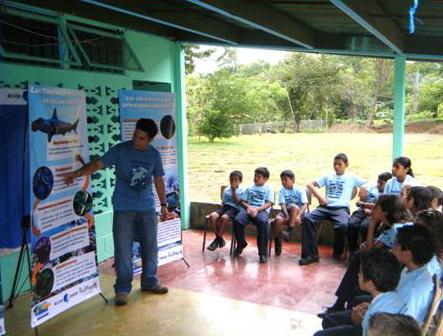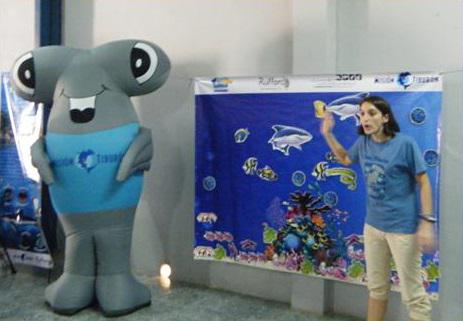Ilena Zanella
The Shark Route is an innovative initiative that seeks to educate elementary students about the importance of marine resources, especially sharks. The aim of this project is that students have a new vision about sharks, and their role in the aquatic ecosystem

The Shark Route will start in September 2009 and will finish in September 2010. We will visit 10 educational centres located in small fishing communities of the Pacific Coast of Costa Rica, where the principal economic livelihood is the artisanal fishery. In order to develop the main goal the project we will carry out several activities with the students and we will explain basic aspects of shark’s biology and its threats. During these visits, we want to clarify to the children that sharks are not fearful creatures, but they are in fact vulnerable species that accomplish a vital role in the trophic chain of the oceans. At the end of each visit, the students will see sharks as charismatic animals that actually help the humanity to have a healthy marine ecosystem.

The visits will take place in educational centres of fishing communities (where students are the children of local fishermen), because we try to create conscience not only on children, but also on their parents, who support their families with marine resources, every day scantier. We will work with the elementary students by an interactive methodology, stimulating respect and love to marine life, especially towards the sharks. We hope that these activities will improve a children`s new attitude towards marine resources, which will hopefully carry on with them for the rest of their life.
This way, we will promote that new generations of fishermen are more responsible towards the marine resources, and also for some students, might be the beginning of a successful career as conservationist. In fact, with these activities we want to clarify the role of biologists and researchers in the society. It is important that the fishing communities understand that these professionals do not try to eliminate fisheries, but they want to help the fishermen to manage correctly the marine resources, in order to guarantee their long-term sustainability. In fact, these activities want to join the fishing sector with the scientist sector, improving new future initiatives in favour of marine life.